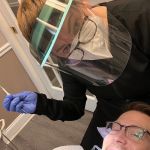How to Prevent Gum Disease During Pregnancy
Pregnancy is a time of great change for a woman's body, and while many are aware of the need for extra care in areas like diet, exercise, and overall health, dental care is often overlooked. However, oral health during pregnancy is just as important as the health of the rest of the body. One common issue pregnant women face is an increased risk of gum disease. In fact, hormonal changes during pregnancy can make the gums more susceptible to inflammation and infection, which may lead to a condition called pregnancy gingivitis. This can, in turn, lead to more serious problems if left untreated, such as periodontitis, which can affect the overall health of your teeth and gums.
Gum disease during pregnancy is common, affecting a significant portion of expectant mothers, but the good news is that it is preventable. The key lies in a combination of consistent dental hygiene, regular visits to your dentist, and specific preventive measures that can keep your gums healthy throughout this important time. In this article, I’ll explain how gum disease develops during pregnancy, the risk factors involved, and most importantly, how you can prevent it to ensure both your health and the health of your baby.
- 1. Understanding Pregnancy Gingivitis
- 2. How Hormonal Changes Affect Oral Health
- 3. Maintaining Good Oral Hygiene
- 4. The Role of Regular Dental Check-ups
- 5. The Importance of Nutrition for Gum Health
- 6. Dealing with Gum Pain During Pregnancy
1. Understanding Pregnancy Gingivitis
Pregnancy gingivitis is a condition that causes the gums to become swollen, red, and bleed easily. It is common during pregnancy, and for many women, it’s the first sign that something is wrong with their oral health. This condition is typically caused by hormonal changes that increase the blood flow to the gums, making them more sensitive to plaque and bacteria.
As a pregnant woman, I experienced pregnancy gingivitis myself, which was both uncomfortable and concerning. The swelling and bleeding were more pronounced after brushing and flossing, and I was worried it might lead to something more serious. Fortunately, my dentist reassured me that it was a common and treatable condition. The good news is that by following a solid oral care routine and getting the right treatment, pregnancy gingivitis can be reversed before it causes lasting damage. Ignoring the problem, however, can lead to periodontitis, a more serious form of gum disease that could affect your overall health and even lead to complications during pregnancy.
2. How Hormonal Changes Affect Oral Health
During pregnancy, the body undergoes various hormonal changes that have a direct impact on oral health. Increases in hormones like progesterone and estrogen cause the blood vessels in the gums to swell, which makes them more vulnerable to inflammation. Additionally, these hormonal changes can alter the way the body responds to plaque buildup, making it easier for bacteria to thrive and cause infection.
From my own experience and research, I learned that pregnancy not only affects how my body reacts to food and stress but also changes the way my body handles oral bacteria. This made me realize how important it was to double down on my dental care routine, as my body’s typical defenses were altered. By staying proactive with dental hygiene, I was able to prevent further issues and protect my health. It’s essential to understand how your body’s hormonal changes can affect your gums, so you can take action before any serious issues arise.
3. Maintaining Good Oral Hygiene
The foundation of preventing gum disease during pregnancy is good oral hygiene. Brushing your teeth at least twice a day, using fluoride toothpaste, and flossing daily are key steps in keeping your gums and teeth healthy. The more plaque and bacteria you remove, the less likely they are to cause gum disease.
I personally found that maintaining good oral hygiene during pregnancy was critical to preventing the onset of gingivitis. Brushing thoroughly and flossing to remove any food particles and plaque buildup helped significantly reduce inflammation and bleeding in my gums. Regular brushing also prevented the buildup of harmful bacteria, which could have worsened my condition. While I made sure to follow these habits closely, I also made an effort to use an antibacterial mouthwash to help prevent any bacterial growth between meals.
4. The Role of Regular Dental Check-ups
Visiting your dentist regularly is one of the best ways to prevent gum disease during pregnancy. Regular dental check-ups allow your dentist to identify any signs of gingivitis or other oral health issues early on. Additionally, professional cleanings remove plaque buildup that you might have missed, helping to keep your gums and teeth in top shape.
Throughout my pregnancy, I made it a priority to schedule more frequent dental check-ups, especially since my oral health was more vulnerable. I found that my dentist was able to detect minor issues before they became major problems, which gave me peace of mind. By being proactive and working with a dental professional, I was able to manage my oral health more effectively. If you’re pregnant, scheduling regular visits to the dentist is just as important as any other aspect of prenatal care.
5. The Importance of Nutrition for Gum Health
What you eat during pregnancy plays a crucial role in your oral health. Nutrient-rich foods like fruits, vegetables, and dairy products provide the vitamins and minerals your gums need to stay strong and fight infection. Calcium, vitamin C, and folic acid are especially important for maintaining gum health and preventing inflammation.
I noticed a significant improvement in my gum health after I focused on eating nutrient-dense foods. For example, foods rich in vitamin C like oranges helped reduce gum swelling and bleeding. Drinking plenty of water also kept my gums hydrated, which made a noticeable difference in how they felt. Adding healthy foods to my diet not only helped my overall health during pregnancy but also gave my gums the nutrients they needed to stay healthy and strong.
6. Dealing with Gum Pain During Pregnancy
If you’re experiencing pain or swelling in your gums during pregnancy, it’s important to address it right away. Using a soft toothbrush, avoiding harsh mouthwashes with alcohol, and applying cold compresses to the affected area can help alleviate discomfort. If the pain persists or worsens, don’t hesitate to reach out to your dentist for advice.
During my pregnancy, I found that using a saltwater rinse helped soothe my swollen gums. It was a gentle, natural remedy that offered some relief. Additionally, I made sure to brush with a soft-bristled toothbrush, as the gentle brushing reduced irritation. I also spoke to my dentist about over-the-counter treatments for gum pain, which proved to be helpful when I was dealing with the discomfort of pregnancy gingivitis.
Pregnancy can be a wonderful yet challenging time, but taking care of your oral health should always be a priority. By maintaining proper oral hygiene, scheduling regular dental visits, eating a balanced diet, and addressing any gum issues promptly, you can significantly reduce the risk of gum disease and enjoy a healthier pregnancy. Want to learn more about dental care during pregnancy? Visit Dentistry Toothtruth for helpful tips and dental care products to keep your smile shining throughout your pregnancy.







 Children's Dentistry of the Palisades4.0 (137 review)
Children's Dentistry of the Palisades4.0 (137 review) Uchida Clyde Y DDS3.0 (9 review)
Uchida Clyde Y DDS3.0 (9 review) Champlin Family Dental4.0 (613 review)
Champlin Family Dental4.0 (613 review) Yonkers Dental Implants Center4.0 (63 review)
Yonkers Dental Implants Center4.0 (63 review) Dental Specialty Associates4.0 (1196 review)
Dental Specialty Associates4.0 (1196 review) Samson Wahl & Associates5.0 (6 review)
Samson Wahl & Associates5.0 (6 review) The Importance of Oral Health Education During Pregnancy for a Healthy Pregnancy
The Importance of Oral Health Education During Pregnancy for a Healthy Pregnancy Best Tips for Brushing Your Teeth Properly for Healthy Gums: Essential Techniques for Oral Health
Best Tips for Brushing Your Teeth Properly for Healthy Gums: Essential Techniques for Oral Health Why Skipping Dental Checkups Can Lead to Bigger Oral Health Problems
Why Skipping Dental Checkups Can Lead to Bigger Oral Health Problems Advantages of Porcelain Dental Restorations
Advantages of Porcelain Dental Restorations How Can Diabetes Cause Tooth and Gum Problems? Preventing and Managing Oral Health Issues
How Can Diabetes Cause Tooth and Gum Problems? Preventing and Managing Oral Health Issues Healthy Habits for Promoting Good Oral Health and Hygiene: Tips for a Healthy Smile
Healthy Habits for Promoting Good Oral Health and Hygiene: Tips for a Healthy Smile